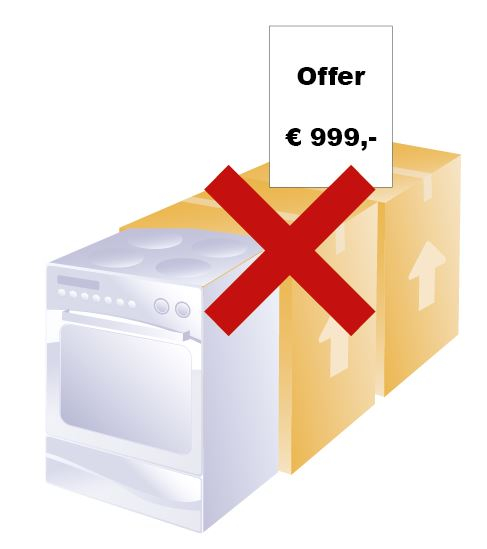Energy labelling requirements for physical shops
It is your responsibility as a shop owner to:
- Ensure that all products subject to energy labelling requirements have an energy label visible on the front or top of the product. However, depending on the product, there can be a different instruction in the product-specific labelling regulation where to put it.
- Request an energy label from the supplier if the label is not provided with the product in the packaging. The new energy labels can also be printed directly from EPREL.
- Ensure the energy label's model designation matches the product.
- Provide the product information sheet (PIS) upon customer request.
Second-hand or used products are not in the scope of the energy labelling requirements, but there are exceptions, e.g. if a second-hand or used product is imported to the EU. See Blue Guide for more details.
Common mistakes
We have compiled the most common mistakes across various product groups:
- No energy label on the product
All products in scope of an energy labelling regulation must have an energy label. - Incorrect size or in black and white
The energy label must have the correct size and be in colour. The size of the energy label and specific placement instructions may apply depending on the product, so please look into the product-specific regulations. - Incorrect placement of the energy label
It is not permitted to place the energy label inside the product – not even for integrated appliances. - Showcase windows
Products displayed in the store's showcase windows must also have an energy label. - Printed energy labels
Avoid printing energy labels yourself, which can can result in poor-quality prints. Requst a label from the supplier, who is responsible for providing the energy labels within five working days. - Damaged energy labels or QR codes
Ensure the QR code on the label is intact and fully readable. Labels with cut-off or damaged edges, or those covered with adhesive tape, are unacceptable. - Confusing the consumers
Do not display any documents near the product or energy label that could resemble an energy label and potentially confuse consumers. Additionally, outdated energy labels must not be shown under any circumstances. - Products in packaging
Products in packaging must have an energy label if they are displayed with price or energy-related information, except for products where the manufacturer is always required to place an energy label on the packaging. Check the product-specific regulations to see if your product is exempted. - Product island
When multiple identical products are displayed together, you do not need to label all of them - labelling just one product is sufficient.
However, if the labelled model is sold, another product in the group must then display the energy label. The energy label must still be placed on the front or top of the products.
If the products are arranged in a cluster accessible from multiple sides, the energy label must be visible to customers from all sides. This can be achieved, for example, by placing the energy label on a sign above the products.
Note that if the product is displayed in multiple locations within the store, each location must include the energy label.
There may be differences in how the national MSAs interpret the requirement regarding the placement of energy labels at product islands. To be sure of good guidance please consult your national MSA on this matter.
Example of a product island


